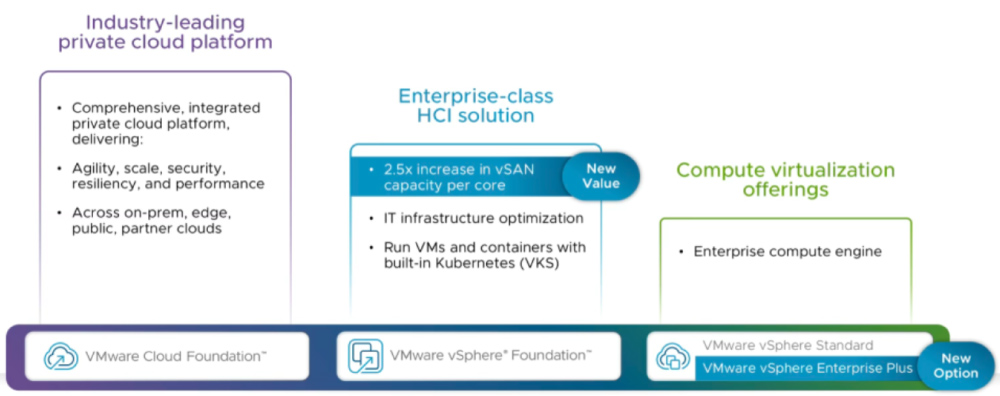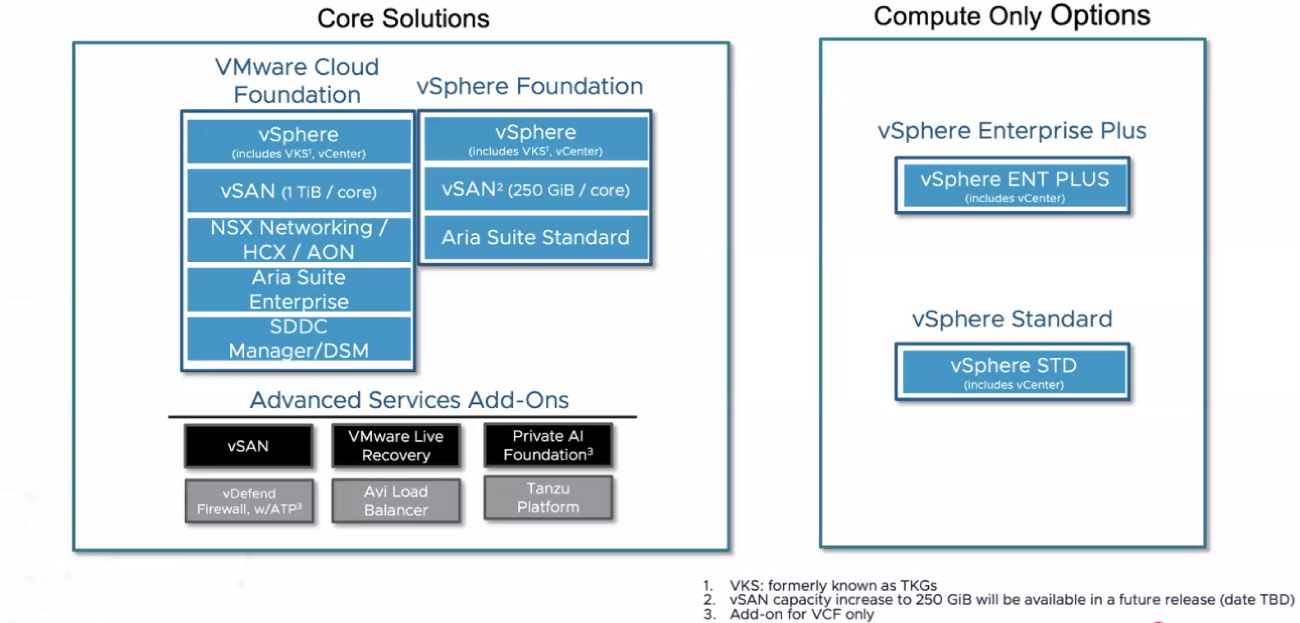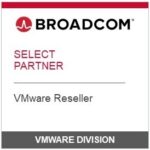On December 11, 2023, VMware was acquired by Broadcom. With this, major changes in licensing were made. VMware has reduced the number of offerings and has transitioned their bundles to subscriptions. Also, in November 2024, vSphere Essentials Plus was replaced by vSphere Enterprise Plus (a new and different product). In this article, we want to give you an overview of the new licensing models of VMware. Also, find a comprehensive FAQ-section below.
Portfolio Simplification Overview: 4 Main Products + Advanced Services Add-ons

VMware’s offerings have been reduced from 168 products, bundles and editions, to just four (4) bundles. These four bundles are:
1) VMware Cloud Foundation (VCF)
2) vSphere Foundation (VVF)
3) vSphere Standard (VVS)
4) vSphere Enterprise Plus (VSEP): This product replaced vSphere Essentials Plus (VVEP) due to weak demand. It is a different product (explained below).
5) Advanced Services Add-ons: These include vSAN, VMware Live Recovery, Private AI Foundation, vDefend Firewall w/ATP, Avi Load Balancer, Tanzu Platform.
The below screenshot shows the new product portfolio of VMware:

VMware Cloud Foundation (VCF)
VMware Cloud Foundation (VCF) is a comprehensive software-defined infrastructure solution designed to provide a cloud operating model on-premises. It combines compute, storage, networking, and cloud management capabilities into a single integrated platform.
This is what the licensing looks like:
- Subscription-based model
- This package is “disconnected”, but there might be connectivity in future (Customers can mix perpetual and new offerings as long as they are “disconnected”)
- Pricing based on per-core usage
- Minimum requirement of 16 cores per CPU (Example: 4 CPUs with 4 cores each equals 64 cores)
- Flexible terms available: 1-, 3-, and 5-year options (supports annual billing and co-term)
- vSAN allocation: 1 Terabyte (TiB) per core
- Select Support: Premium global assistance featuring improved SLAs, senior VMware engineers, and Root Cause Analysis
vSphere Foundation (VVF)
VMware vSphere Foundation (VVF) is a tailored offering designed to optimize data center performance for organizations of all sizes. It is part of the VMware vSphere product line, which is a leading enterprise virtualization platform. It delivers predictive and proactive operations management, purpose-built to enable the best performance, availability, and efficiency from your infrastructure and applications.
The licensing looks like this:
- Subscription-based model
- This package is “disconnected”, but there might be connectivity in future (Customers can mix perpetual and new offerings as long as they are “disconnected”)
- Pricing based on per-core usage
- Minimum requirement of 16 cores per CPU
- Flexible terms available: 1-, 3-, and 5-year options (supports annual billing and co-term)
- Includes Production Support
- Includes vCenter Standard
- Includes VMware Cloud Foundation Operations
- Includes VMware vSphere Kubernetes Service (VKS)
- Includes VMware vSAN Enterprise (250 GiB per core (increased from 100 GiB to 250 GiB as of November 2024)); requires 8.0U2B or newer
vSphere Standard (VVS)
VMware vSphere Standard (VVS) is a server virtualization solution that provides data center consolidation and enhanced application availability. It is designed for organizations that need industry-leading virtualization capabilities without the full suite of features and services offered in higher-end editions.
The licensing looks like this:
- Subscription-based model
- This package is “disconnected”, but there might be connectivity in future (Customers can mix perpetual and new offerings as long as they are “disconnected”)
- Pricing based on per-core usage
- Minimum requirement of 16 cores per CPU
- Flexible terms available: 1-, 3-, and 5-year options (supports annual billing and co-term)
- Includes Production Support
- Includes vCenter Standard
vSphere Enterprise Plus (VSEP)
VMware vSphere Enterprise Plus (VSEP) is a comprehensive virtualization platform that includes advanced features such as vCenter Standard, Distributed Resource Scheduler (DRS), High Availability (HA), Fault Tolerance, and Storage vMotion, designed to optimize performance, availability, and efficiency for enterprise-level workloads.
The licensing looks like this:
- Subscription-based model
- This package is “disconnected”, but there might be connectivity in future (Customers can mix perpetual and new offerings as long as they are “disconnected”)
- Pricing based on per-core usage
- Minimum requirement of 16 cores per CPU
- Flexible terms available: 1-, 3-, and 5-year options (supports annual billing and co-term)
- Includes Production Support
- Includes vCenter Standard
![]() Find a vSphere Product Line Comparison here: VMware Datasheet vSphere Product Line Comparison
Find a vSphere Product Line Comparison here: VMware Datasheet vSphere Product Line Comparison
Need help with your organization’s Software Licensing? Book a consultation with our specialists and get tailored advice for your business needs!
FAQ
What happens when the subscription expires?
Updated 2024-12-26: There is no grace period at the expiration of the subscription. Customers must promptly renew their subscription to avoid a late renewal fee.
How will hosted IT services for non-“affiliated” companies be regulated in the future?
Regulations for these services remain unchanged and are governed by the General Terms, Software Exhibits, and Product Guide.
Regarding subsequent purchases: Can the rental licenses that may be purchased later and the perpetual licenses already available in the Enterprise Licensing Agreement (ELA) be used in parallel in the mix?
A mix of perpetual and subscription licenses is only possible in the vSphere area counted on a host-based basis. For vSAN, a mix of subscription and perpetual licenses is not possible.
Can VMware Cloud Foundation (VCF) and vSphere Foundation (VVF) be mixed? What about global deployment rights?
Outside of a VMware Enterprise Order (VEO) / Enterprise Licensing Agreement (ELA), mixing VMware Cloud Foundation (VCF) and vSphere Foundation (VVF) is possible. However, within a VEO, mix-and-match is not typically allowed.
What are the storage expansion options for VVF per Core 250GB vSAN storage?
The vSAN add-on can be used to expand storage, but licensing starts from scratch rather than just adding capacity.
Is there anything known about the planned conversion of existing VMware Hybrid Purchasing Program (HPP) credits into subscription credits as part of a VMware ELA?
Details about the conversion from HPP credits to other credits are not yet available.
What happens to existing support contracts that were renewed for 2 years last year?
Existing support contracts will continue unchanged until the end of the term, with extension options available thereafter.
Can you provide pricing information for licensed editions? Where can I send price requests?
For pricing inquiries, please contact SCHNEIDER IT MANAGEMENT.
Are there still offers/discounts when handing over the perpetual licenses?
Yes, individual negotiations for discounts are available with Broadcom.
What are the deployment rights of a VMware Enterprise Order (VEO)?
Deployment rights depend on the General Terms, Software Exhibits, and Product Guide. Negotiable changes may include global deployment rights, minority shareholdings, or future deployments.
Now that vSAN is licensed via GiB/TiB, what will change for me if I have a vSAN cluster (e.g., with vSAN Advanced and vSphere Enterprise Plus)?
When you move to a subscription, you must license the appropriate amount of vSAN Raw Capacity. In the case of vSphere Enterprise Plus and vSAN Advanced, the recommended upgrade would be to vSphere Foundation (250 GiB/Core included). If additional volume is required, it can be expanded with the vSAN add-on. It’s important to note that the volume within the vSphere Foundation Bundle is bound to the VVF Core and cannot be aggregated within the environment.
Is there any information on converting Remote Office Branch Office (ROBO) licenses?
Currently, there’s no 1:1 solution for ROBO licenses. In some cases, vSphere Standard could serve as an alternative.
Is there a possibility of a trade-in? Or is there any information about the prices that VMware charges?
While VMware has announced a trade-in program, details are yet to be communicated. Individual discounts are offered in current customer situations for transitioning to the subscription model.
What are the storage expansion options for VMware vSphere Foundation (VVF) per Core 250GB vSAN storage?
Additional TiB can be added using the vSAN add-on. However, with VVF, the add-on must be licensed “from 0,” and not just the delta.
Is there any further information on how VxRail will continue in the future?
Due to DELL’s termination of the contract with VMware, the program may be discontinued, but concrete statements are not available.
Can license bundles such as vSphere Foundation (VVF) and vSphere Standard be combined? E.g.: There are two clusters in a vCenter – can one cluster be licensed with vSphere Foundation and the other cluster with vSphere Standard?
Yes, generally speaking, that’s possible. It may be mixed, but is absolutely not recommended, as the features of the Enterprise Plus and Standard licenses are different. Features such as Fault Tolerance (FT), Distributed Resource Scheduler (DRS), Distributed Power Management (DPM) only work between servers that have licensed the same features.
Is there any change in Horizon Enterprise (for VDIs)? Or do these adjustments only affect the server part?
No changes have been announced yet for Horizon Enterprise.
Will there still be education licenses or subscriptions?
Currently, there are no special conditions for the Education/Academic area. Individual discounts need to be negotiated with VMware.
What is the cost increase?
Costs vary based on individual situations. Consultation with licensing experts will help you with that. Contact SCHNEIDER IT MANAGEMENT for help.
Do I need to relicense with new license keys?
Yes, new license keys must be installed when switching from perpetual to subscription licenses.
More information
Latest announcement: https://news.broadcom.com/cloud/bringing-more-value-and-options-to-the-vmware-cloud-foundation-portfolio.
For our vendor page of VMware, please visit: https://www.schneider.im/software/vmware.
Please contact us for expert services on your specific VMware requirements and to request a quote today.

